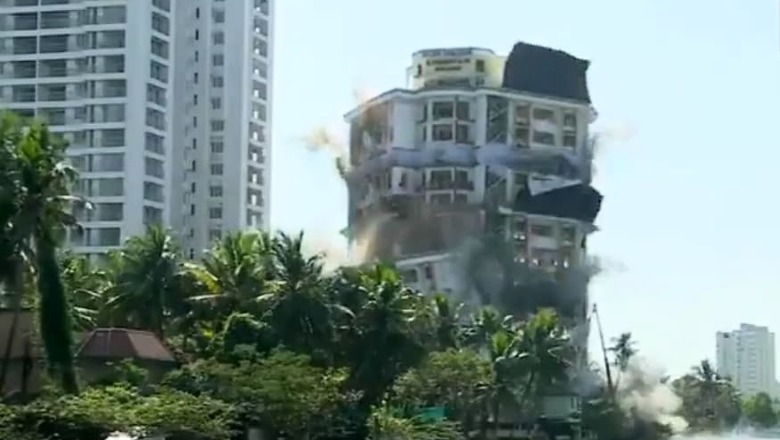
views
The demolition of four huge residential towers in Kochi on January 11 and 12, following a 10-year litigation and a Supreme Court order of September last year, gives a big fillip to environmental laws and other building related laws which are flouted across the country with impunity. Residents of the flats were evacuated four months ago and will get a compensation of Rs 25 lakh each from the Kerala government.
It was the biggest such demolition of residential towers in India and a telling blow to the real estate sector which flouts various rules with impunity across the country in connivance with municipal and panchayat officials. Maradu, a few kilometres off central Kochi, was a panchayat area when it got a no-objection certificate in 1996. Later, it became a municipality and came under different set of laws.
The question before the SC was whether the area fell under Coastal Regulation Zone-CRZII (where buildings already exist close to shoreline) or CRZ III (mostly virgin territory). A committee appointed by the SC ruled that I came under CRZ III, making it liable to be demolished.
The 17-storey apartment towers were just on the brink of a lake. Builders of a fifth tower had pulled out after litigation started under the auspices of the Kerala Coastal Zone Management Authority, which claimed that its permission was not sought and pointed out various violations.
Various legal experts had pointed out that SC went much beyond its jurisdiction in this administrative matter. A curative petition was also rejected by the Supreme Court. The perfectly executed implosions were done under the supervision of the government agency PESO, and was led by Dr R Venugopal, deputy chief controller of explosives. Two other private agencies, Edifice Engineering and Vijay Steels carried out the actual demolition.
The Maradu demolitions open up various issues for the hospitality and real estate sector in Kerala. There are a special set of rules governing Kerala because of its network of lakes, rivers and backwaters. The operative part of the rules is that a building has to be at least 50 metres away (amended last year by the central government from the earlier 100 metres) from the banks of the high tide line of the river or lake. This rule has clearly been violated by the four apartments.
An estimated 20,000 big and small properties are in violation of some aspect of the Coastal Regulation Zone rules, most of them being resorts. For example, an RTI reply to this correspondent stated that the five-star Raviz Resorts in Kollam, right on the banks of the Ashtamudi lake in Kollam, had not even sought environment clearance.
Another five-star resort on an island in the sprawling Vembanad lake is also going to be demolished next month following another SC order this week. The magnificent five-star Grand Hyatt hotel of the Lulu group opened two years back in an island, a few kilometres from the site of the present demolition, has also violated various land and environmental rules, according to reports in The Hindu two years back. All this points to a nefarious nexus between the administration and big builders. The Dubai-based Lulu group anyway has a free run in Kerala, owning huge properties across the state and a sprawling new mall coming up in Trivandrum after the huge success of the Lulu mall in Kochi.
But Kerala has little option than to connive at such flouting of the law, considering that tourism keeps the state going. The problem in small Kerala is that there is a shortage of land and most big constructions come up near lakes or rivers. After this demolition, a huge number of projects may have to be scaled down or scrapped altogether.
The entire Vembanad and Astamudi lakes to the south are surrounded by resorts and hotels, and not all stick to all the rules. Vembanad lake, which is the hub of houseboats, is classified under the critically vulnerable coastal area (CVCA). Kerala depends on services and tourism sector for its survival and jobs, and so the economic fallout of this will be felt in the coming years.
While Kerala’s fragile environmental ecosystem gets a big backing with these judgments, the question is: where will Kerala generate jobs and income from after the hospitality sector takes the blow? Kerala’s migration mania to the Gulf is tapering off at a fast pace, drastically sending up the population of districts like Malapuram and Kozhikode in the north. One out of every five rupees remitted to India from abroad comes to Kerala.
The Kerala Migration Survey of 2018 says there are over two million Keralites working across the world. They have been replaced in the Kerala labour market by three million migrants from Bengal and Assam and the northeast. “Kerala has to slowly move towards a new model from the remittance economy that it is today,” says S Iruduya Rajan of the Centre for Development Studies, Trivandum, who has been tracking Kerala’s remittance economy.
The state, however, is making a big impact in the IT sector by supplying qualified engineers and graduates to the hundreds of IT establishments in the state and the neighbouring Tamil Nadu and Karnataka. The IT park in Trivandrum offers the cheapest floor space and has managed to get a few big companies, including Nissan, to set up backend offices.
But the problem is huge. If Kerala does not get into manufacturing and textile by backing small and medium companies, it will be a tough grind. A lot of dust and debris from the Maradu demolitions will settle on the Kerala economy.
(The author is a senior journalist. Views expressed are personal.)


















Comments
0 comment